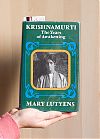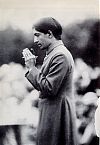
Mary Lutyens
Krishnamurti
The Years of Awakening
I do not read much Krishnamurti. The book we have, Think on These Things, is a series of talks followed by questions and answers. Not that I am a pure novel reader but I am attached to its form. I like my teachings to come through characters and more or less drama, which was probably why I needed to read this biography: I had to attach a man to powerful and resonating words. Krishnamurti’s words, when spoken by the man himself, play my heart as if it were a harp, with each string tugged is a new note drawn and the infinite opens as if it were as easy as opening a door. That’s probably why I don’t read him much, I get too maudlin with his words.
Mary Lutyens does a first-class biographer’s job. She is meticulous as proved by her recording of dates and events; she never indulges in the personal pronoun and refers to herself in the third; she allows those in Krishna’s life to show themselves through their own words, letters and journals. Though her lack of “I” annoyed me, I appreciated her steady tone. She wrote of occult and esoteric practices and the members of the Theosophical Society of that time without a blink of her eyes. The Years of Awakening reads like a life-report interspersed with the miraculous and mystical.
Krishnamurti led most of his young life under the guise of vehicle for the next coming of the World Teacher, comparable to Jesus, to Buddha, to Zoroaster. He was a good boy, he studied, he did what he was told; he grew up in the bosom of Theosophy which gave onto him the luxury of freedom from worry about world matters, like money and family and “home.” All he had to do was to ready himself, his body, his mind, his soul for that day when the Master, Lord Maitreya, found the vehicle adequately prepared. An organization was created for him by his discoverers Annie Besant and Charles Leadbeater, the Order of the Star. Krishnamurti, in this guise, led a life of relative ease and it is of this benevolence that I have thought.
I am amazed and grounded in the solidity of Krishnamurti’s words:
Then you will see that it matters not what you do, what you read, what any person says you are or not, but that you should have the intense desire to enter into that abode where dwells Truth.
Imagine any young boy being taken out of his hovel and poverty to be brought up under the obscure pressures of becoming the next great World Teacher by a society whose members were full across the world. Krishnamurti was set up, almost framed into great power; imagine what any lesser boy would do. There is almost no one who would not enter into the greedy race of material acquisition, would not demand followers and disciples, large paintings with one’s face on them. He was given land and money, nice clothes, a car. I do not think he was taught humility, Krishnamurti was.
With his life of leisure—but for his studies and responsibility of writing a column for the Herald of the Star —separated from the demands put on by society, Krishnamurti was able to dive into the life of his own mind and his own soul. I think this separation is necessary: remain detached from the world’s affairs which will always churn the same with different names until the end of time, for then one can really concentrate, really be true within one’s self. Krishnamurti advanced along the stages of his “becoming” and climbed higher and higher with physical suffering and pain so that eventually he stood on the “mountain top,” he felt the true wind blowing through his emptied self.
Are these our potentials which wait for us with thought and repose, outside the clutter of daily lives? Strip down and simplify. We continue to see ourselves as our own best defining features, titles, names, that look in the mirror and we refuse to hold up to ourselves the understanding which will no doubt shatter the false foundations that have been created out of boredom. We are afraid and though each person may be as god we shudder at the godly in ourselves and turn back. To follow Krishnamurti up the “mountain top” takes humility and the renouncement of many things to which we are attached.
Though having been declared the World Teacher must have contributed to a higher realm of Krishnamurti’s view. The beliefs of Theosophy, which he later disavowed, nevertheless lent him solid concepts for his mystical experiences like a spring board. The Lord Maitreya came to him and filled him; Krishnamurti had at times extreme physical suffering when his body was being prepared; he had very intense spiritual discoveries that others witnessed and swore something else came over him or into him; his friends rarely doubted, especially once out of his youth, that he was the World Teacher. What was not possible?
It was near the biography’s end that it became almost thrilling. Krishnamurti became extremely sure in his experiences and in his beliefs so that he was able to speak out with a conviction that never faltered or compromised. He spoke, not as the representative of any society or way of belief, but as a man who had found without doubt, the godly within himself.
If you seek the truth you must go out, far away from the limitations of the human mind and heart and there discover it—and that Truth is within yourself. Is it not much simpler to make Life itself the goal—Life itself the guide, the Master and the God—than to have mediators, gurus, who must inevitably step down the Truth and hence betray it?
Needless to say, those in the Theosophical Society, those who had created such a fuss over this coming of the Lord, expected immortal return, power and title. They became angry with Krishnamurti’s teaching for what he said had no place for anyone in anyone’s spiritual development but that person’s own determination, their own questions, their own way to Truth. Most did not understand what Krishnamurti told them; thinking for themselves to find fulfillment was so beyond any teachings gone before. Most could not dream of independence, their whole souls rested upon a predetermined path to a predetermined Truth.
I maintain that Truth is a pathless land, and you cannot approach it by any path whatsoever, by any religion, by any sect.
With these words Krishnamurti dissolved the Order of the Star. He insisted that the first step to freedom was to think for one’s self.
The moment you follow someone you cease to follow Truth. I am not concerned whether you pay attention to what I say or not. I want to do a certain thing in the world and I am going to do it with unwavering concentration. I am concerning myself with only one essential thing: to set man free.
Krishnamurti was a great man and his words ring out crystal and clear. We have great need for him. I have no doubt that Krishnamurti is an eternal presence by whatever way and through whatever proclamations got him there. The important thing is that he spoke and that he has given us the privilege of his words. When one speaks or writes so nakedly, so truthfully, so divested of self there will be those who listen and who understand. Go, go to your open space within and rest there for a bit.
[Liberation] is a great fire and when you enter it you become the flame, and then you go forth as sparks, part of that flame.
And burn.
Commentary for Krishnamurti
· · · · · · · · · · · · · · · · · · · ·

1 On Thursday 25 February 2010 Emily wrote:
He spoke so bitterly of education in Think On Things. At least, our idea of education. I realize now, why. He states several times that we must go out and discover ourselves and do what we love. It is because he knows nothing else. He does not realize that our society could not function without those who “struggle” with education. He might have been a great thinker and a wonderful man, but did he truly know the hardships of real life? Everyone cannot just go out from their life and discover themselves. Many of us do not have the luxury as he did. Very unrealistic and it almost seems like he is asking for a Utopian society which will never exist…